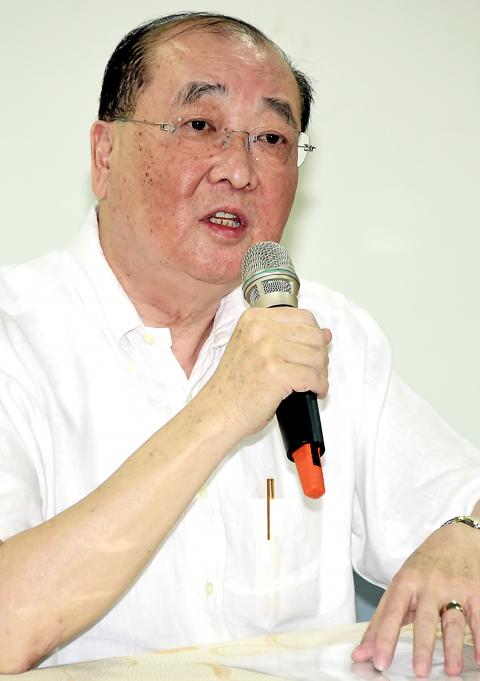Minister of Culture Hung Meng-chi (洪孟啟) yesterday tendered his resignation, despite dismissing a report alleging the ministry offered Chinese Nationalist Party (KMT) lawmakers special allowances in order to have its proposed budget passed without issue.
Next Magazine yesterday reported the ministry, having part of its budget frozen last year, proposed in May to apportion NT$2.5 million (US$75,465) to each KMT lawmaker to ensure the passage of the ministry’s budget this year.
The report alleged, showing what it said to be copies of ministry documents, that top ministry officials made a resolution that lawmakers could apply for the subsidy as long as they are KMT legislators, and that KMT lawmakers sitting on the legislature’s Education and Culture Committee were to be funded first.

Photo: Pan Shao-tang, Taipei Times
Hung denied the allegation, saying that, while the proposal was tabled in an internal meeting, in which only he, the chief secretary and three deputy ministers were present, it was immediately rejected based on a principle of administrative neutrality.
“I am sorry for the trouble it has caused the Executive Yuan and KMT lawmakers, who have not been offered anything and have not submitted any [applications for allowances],” Hung said, adding that he has tendered his resignation to Premier Mao Chi-kuo (毛治國) as the incident has tainted the ministry’s image.
Executive Yuan spokesperson Sun Lih-chyun (孫立群) said Mao had called Hung to ask him to remain in his post and returned Hung’s letter of resignation before a news conference held by Hung at 3pm yesterday.
Six of the seven KMT lawmakers of the legislature’s Education and Culture Committee denied that they had received any special subsidy from the ministry, with only Chiang Nai-shin (蔣乃辛) failing to respond to the magazine’s call, the report said.
Chiang said he has not heard of the proposal or seen the document.
KMT Legislator Chen Shu-hui (陳淑慧) also dismissed the allegations, denying that there is any special subsidy for the governing party’s lawmakers.
“I have called the ministry and they refuted [the accusation]. There was no meeting on it, so there was no official document [on the subsidy] either,” he said.
KMT Legislator Kung Wen-chi (孔文吉) said: “[The allegation] is ridiculous as the ministry is probably the least capable of cooperating with and [attending to lawmakers’ needs].”
Next Magazine later yesterday accused Hung of lying when he said the proposal was rejected without ever being implemented, alleging that, according to the magazine’s source, KMT lawmakers from central and southern regions of the nation have already received subsidies amounting to at least NT$1 million.
The magazine reported that the ministry’s top echelons have, on many occasions, invited related officials to discuss the allocation and follow up on the process after a resolution was made.

US President Donald Trump yesterday announced sweeping "reciprocal tariffs" on US trading partners, including a 32 percent tax on goods from Taiwan that is set to take effect on Wednesday. At a Rose Garden event, Trump declared a 10 percent baseline tax on imports from all countries, with the White House saying it would take effect on Saturday. Countries with larger trade surpluses with the US would face higher duties beginning on Wednesday, including Taiwan (32 percent), China (34 percent), Japan (24 percent), South Korea (25 percent), Vietnam (46 percent) and Thailand (36 percent). Canada and Mexico, the two largest US trading

China's military today said it began joint army, navy and rocket force exercises around Taiwan to "serve as a stern warning and powerful deterrent against Taiwanese independence," calling President William Lai (賴清德) a "parasite." The exercises come after Lai called Beijing a "foreign hostile force" last month. More than 10 Chinese military ships approached close to Taiwan's 24 nautical mile (44.4km) contiguous zone this morning and Taiwan sent its own warships to respond, two senior Taiwanese officials said. Taiwan has not yet detected any live fire by the Chinese military so far, one of the officials said. The drills took place after US Secretary

CHIP EXCEPTION: An official said that an exception for Taiwanese semiconductors would have a limited effect, as most are packaged in third nations before being sold The Executive Yuan yesterday decried US President Donald Trump’s 32 percent tariff on Taiwanese goods announced hours earlier as “unfair,” saying it would lodge a representation with Washington. The Cabinet in a statement described the pledged US tariffs, expected to take effect on Wednesday next week, as “deeply unreasonable” and “highly regrettable.” Cabinet spokeswoman Michelle Lee (李慧芝) said that the government would “lodge a solemn representation” with the US Trade Representative and continue negotiating with Washington to “ensure the interests of our nation and industries.” Trump at a news conference in Washington on Wednesday announced a 10 percent baseline tariff on most goods

THUGGISH BEHAVIOR: Encouraging people to report independence supporters is another intimidation tactic that threatens cross-strait peace, the state department said China setting up an online system for reporting “Taiwanese independence” advocates is an “irresponsible and reprehensible” act, a US government spokesperson said on Friday. “China’s call for private individuals to report on alleged ‘persecution or suppression’ by supposed ‘Taiwan independence henchmen and accomplices’ is irresponsible and reprehensible,” an unnamed US Department of State spokesperson told the Central News Agency in an e-mail. The move is part of Beijing’s “intimidation campaign” against Taiwan and its supporters, and is “threatening free speech around the world, destabilizing the Indo-Pacific region, and deliberately eroding the cross-strait status quo,” the spokesperson said. The Chinese Communist Party’s “threats